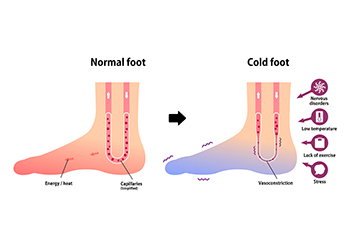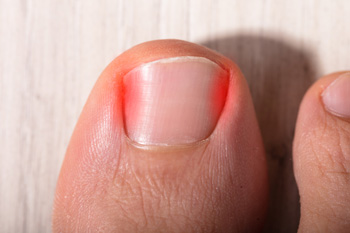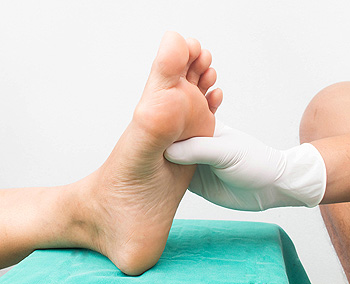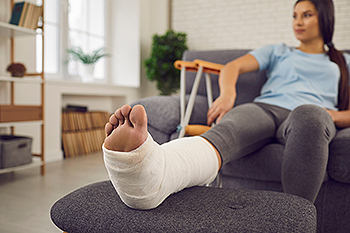Items filtered by date: May 2023
Cold Feet Can Indicate Serious Problems

In most cases, having cold feet may simply be an indication to put on heavy socks and turn up the thermostat. But sometimes the sensation of having cold feet can indicate underlying health conditions that should not be ignored. Cold feet can be a sign that blood flow to the lower extremities is compromised, a condition common to those with high cholesterol. Another cause of cold feet may be due to nerve damage, such as peripheral neuropathy, which is a sign frequently experienced by diabetics. Cold feet also may indicate liver or kidney disease. Cold feet may be the result of a sedentary lifestyle that includes long periods of sitting with few periods of exercise. Smoking is another factor that can lead to cold feet, as certain chemicals in cigarettes can cause blood vessels to become irritated and inflamed, thereby restricting blood flow. Cold feet can also be caused by an underactive thyroid gland, anemia, stress, and anxiety. If you frequently experience the sensation of cold feet, it is suggested that you make an appointment with a podiatrist for an exam and diagnosis.
Everyday foot care is very important to prevent infection and other foot ailments. If you need your feet checked, contact Dr. Kevin Davis from Davis Foot & Ankle Centers. Our doctor can provide the care you need to keep you pain-free and on your feet.
Everyday Foot Care
Often, people take care of their bodies, face and hair more so than they do for their feet. But the feet are a very important aspect of our bodies, and one that we should pay more attention to. Without our feet, we would not be able to perform most daily tasks.
It is best to check your feet regularly to make sure there are no new bruises or cuts that you may not have noticed before. For dry feet, moisturizer can easily be a remedy and can be applied as often as necessary to the affected areas. Wearing shoes that fit well can also help you maintain good foot health, as well as making it easier to walk and do daily activities without the stress or pain of ill-fitting shoes, high heels, or even flip flops. Wearing clean socks with closed shoes is important to ensure that sweat and bacteria do not accumulate within the shoe. Clean socks help to prevent Athlete’s foot, fungi problems, bad odors, and can absorb sweat.
If you have any questions please feel free to contact our office located in Springfield, TN . We offer the newest diagnostic and treatment technologies for all your foot and ankle needs.
How Did I Get an Ingrown Toenail?

The big toe is often affected if an ingrown toenail develops. It is defined as the toenail growing into the skin instead of over it and can cause severe pain and discomfort. The medical term for an ingrown toenail is onychocryptosis, or unguis incarnates, and this condition may happen from wearing shoes that are too tight. It may also develop from genetic reasons or if the toenails are trimmed improperly. The noticeable symptoms can include tenderness surrounding the affected nail, and it may be red or ooze pus. An ingrown toenail can become a serious foot condition if an infection develops, and it is wise to seek prompt medical attention. Effective prevention methods include trimming the toenails straight across instead of in a curved fashion and wearing shoes that are made of breathable materials. The latter may also be helpful in preventing sweaty feet, which can lead to getting an ingrown toenail. If you have developed this painful condition, it is suggested that you seek the counsel of a podiatrist who can efficiently treat ingrown toenails.
Ingrown toenails may initially present themselves as a minor discomfort, but they may progress into an infection in the skin without proper treatment. For more information about ingrown toenails, contact Dr. Kevin Davis of Davis Foot & Ankle Centers. Our doctor can provide the care you need to keep you pain-free and on your feet.
Ingrown Toenails
Ingrown toenails are caused when the corner or side of a toenail grows into the soft flesh surrounding it. They often result in redness, swelling, pain, and in some cases, infection. This condition typically affects the big toe and may recur if it is not treated properly.
Causes
- Improper toenail trimming
- Genetics
- Improper shoe fitting
- Injury from pedicures or nail picking
- Abnormal gait
- Poor hygiene
You are more likely to develop an ingrown toenail if you are obese, have diabetes, arthritis, or have any fungal infection in your nails. Additionally, people who have foot or toe deformities are at a higher risk of developing an ingrown toenail.
Symptoms
Some symptoms of ingrown toenails are redness, swelling, and pain. In rare cases, there may be a yellowish drainage coming from the nail.
Treatment
Ignoring an ingrown toenail can have serious complications. Infections of the nail border can progress to a deeper soft-tissue infection, which can then turn into a bone infection. You should always speak with your podiatrist if you suspect you have an ingrown toenail, especially if you have diabetes or poor circulation.
If you have any questions, please feel free to contact our office located in Springfield, TN . We offer the newest diagnostic and treatment technologies for all your foot care needs.
Warning Signs of Diabetic Neuropathy

Diabetic neuropathy is one of the more serious side effects of maintaining high blood sugar levels for a long period of time. Neuropathy brought on by diabetes is the result of damage to the peripheral nerves, blocking the messages that control sensation to the feet. The effect is numbness, tingling, burning pain, and a reduced ability to detect changes in temperature. Weakness in the lower limbs and feet may result in pain, which can be treated with a number of medications. Infections from sores on the feet are commonly associated with peripheral diabetic neuropathy. In many cases, these sores, cuts, or other injuries to the feet become ulcerated because the patient is unable to detect them. Therefore, taking the time each day to inspect the feet, especially the soles, is imperative to ward off further damage. Increasing the level of exercise is thought to be helpful, and some patients receive pain relief from electro-stimulation treatments. If you have diabetes and are experiencing problems in the feet, it is suggested that you make an appointment with a podiatrist for an exam and treatment options.
Diabetic foot care is important in preventing foot ailments such as ulcers. If you are suffering from diabetes or have any other concerns about your feet, contact Dr. Kevin Davis from Davis Foot & Ankle Centers. Our doctor can provide the care you need to keep you pain-free and on your feet.
Diabetic Foot Care
Diabetes affects millions of people every year. The condition can damage blood vessels in many parts of the body, especially the feet. Because of this, taking care of your feet is essential if you have diabetes, and having a podiatrist help monitor your foot health is highly recommended.
The Importance of Caring for Your Feet
- Routinely inspect your feet for bruises or sores.
- Wear socks that fit your feet comfortably.
- Wear comfortable shoes that provide adequate support.
Patients with diabetes should have their doctor monitor their blood levels, as blood sugar levels play such a huge role in diabetic care. Monitoring these levels on a regular basis is highly advised.
It is always best to inform your healthcare professional of any concerns you may have regarding your feet, especially for diabetic patients. Early treatment and routine foot examinations are keys to maintaining proper health, especially because severe complications can arise if proper treatment is not applied.
If you have any questions please feel free to contact our office located in Springfield, TN . We offer the newest diagnostic and treatment technologies for all your foot and ankle needs.
Do Your Child's Feet Hurt?
Exercises Can Help Prevent Falls by Seniors

As a person ages, their reflexes, stability, and coordination are likely to diminish. Additionally, they lose strength, and their eyesight generally with time declines. When taken as a whole, these factors can sharply increase the risk of a senior citizen falling. One way of helping to reduce the chances of falling is to improve balance. Experts believe that by spending between 20 and 30 minutes a day to build up muscle strength and improve coordination, a senior may walk more independently and be less likely to fall. One simple exercise to improve balance is by standing on one leg, while lightly holding onto a chair back or wall for stability, for 30 seconds. Then switch legs. Over time and with practice, the goal is to balance for up to one minute. The shuffle step involves lateral movement. Start with your feet together and take a step with the right foot. Then slide the left foot to it. Repeat by traveling to the other side of the room. Reverse. In time, try to increase speed. You may wish to have a healthcare worker or friend be there for support if needed. For more information on exercises to increase stability, strength, and coordination, it is suggested that you make an appointment with a podiatrist.
Preventing falls among the elderly is very important. If you are older and have fallen or fear that you are prone to falling, consult with Dr. Kevin Davis from Davis Foot & Ankle Centers. Our doctor will assess your condition and provide you with quality advice and care.
Every 11 seconds, an elderly American is being treated in an emergency room for a fall related injury. Falls are the leading cause of head and hip injuries for those 65 and older. Due to decreases in strength, balance, senses, and lack of awareness, elderly persons are very susceptible to falling. Thankfully, there are a number of things older persons can do to prevent falls.
How to Prevent Falls
Some effective methods that older persons can do to prevent falls include:
- Enrolling in strength and balance exercise program to increase balance and strength
- Periodically having your sight and hearing checked
- Discuss any medications you have with a doctor to see if it increases the risk of falling
- Clearing the house of falling hazards and installing devices like grab bars and railings
- Utilizing a walker or cane
- Wearing shoes that provide good support and cushioning
- Talking to family members about falling and increasing awareness
Falling can be a traumatic and embarrassing experience for elderly persons; this can make them less willing to leave the house, and less willing to talk to someone about their fears of falling. Doing such things, however, will increase the likelihood of tripping or losing one’s balance. Knowing the causes of falling and how to prevent them is the best way to mitigate the risk of serious injury.
If you have any questions, please feel free to contact our office located in Springfield, TN . We offer the newest diagnostic and treatment technologies for all your foot care needs.
Chronic Pain from Broken Ankles

A broken or fractured ankle can interfere with every aspect of one’s life. Besides interfering with life routines, a broken ankle can cause severe discomfort, and possibly chronic pain years later. This can happen from prolonged inflammation of the joints, tissues, and bone, which may be caused by arthritis, or a bone infection. An anti-inflammatory diet, which involves eliminating processed food, refined sugar, and excessive carbs, may help to reduce chronic inflammation. Nutritional supplements and physical therapy can also help with persistent inflammation. If you have broken your ankle, it is suggested that you make an appointment with a podiatrist and follow the advice that is given. Proper healing of a fractured ankle can significantly help in preventing chronic pain.
Broken ankles need immediate treatment. If you are seeking treatment, contact Dr. Kevin Davis from Davis Foot & Ankle Centers. Our doctor can provide the care you need to keep you pain-free and on your feet.
Broken Ankles
A broken ankle is experienced when a person fractures their tibia or fibula in the lower leg and ankle area. Both of these bones are attached at the bottom of the leg and combine to form what we know to be our ankle.
When a physician is referring to a break of the ankle, he or she is usually referring to a break in the area where the tibia and fibula are joined to create our ankle joint. Ankles are more prone to fractures because the ankle is an area that suffers a lot of pressure and stress. There are some obvious signs when a person experiences a fractured ankle, and the following symptoms may be present.
Symptoms of a Fractured Ankle
- Excessive pain when the area is touched or when any pressure is placed on the ankle
- Swelling around the area
- Bruising of the area
- Area appears to be deformed
If you suspect an ankle fracture, it is recommended to seek treatment as soon as possible. The sooner you have your podiatrist diagnose the fracture, the quicker you’ll be on the way towards recovery.
If you have any questions, please feel free to contact our office located in Springfield, TN . We offer the newest diagnostic and treatment technologies for all your foot care needs.

